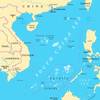Maritime, Measles & Quarantine
Measles is a highly contagious infectious disease. It is so contagious that 90% of non-immune persons will become infected if an infected person is in the immediate vacinity. It is an airborne disease spread through coughs, sneezes, and contact with saliva or nasal secretions. The virus can live for up to two hours in infected airspace or on infected surfaces. Individuals are infectious from four days before symptoms appear until four days after the patient is symptom-free. Symptoms include fever, cough, runny nose, inflamed eyes, and a red, flat rash. Complications may include diarrhea, middle ear infection, and pneumonia. Measles may be fatal to persons with compromised immune symptoms.
Measles vaccine is highly effective at preventing the disease. Modern vaccine provides lifetime immunity in the vast majority of cases. Individuals who received an older vaccine and persons planning international travel should consider getting a booster shot.
The disease is still prevalent in lesser developed parts of Asia and Africa. Recent outbreaks of measles also have been reported in Brazil, Israel, Japan, the Philippines, and Ukraine, as well as some localities in the United States.
Recently, a cruise ship was quarantined in Saint Lucia after a crew member was diagnosed with measles. The ship soon transited to its homeport of Curaçao, where it was again placed under quarantine for a period of time until those who had not been vaccinated were shown to be symptom-free.
Because commercial vessels tend to have crew members from a variety of nations and the crew members rotate regularly, such vessels are at an increased, albeit low, likelihood of having someone on board who is infected with measles. The likelihood is further increased on passenger ships, which have a rapid turnover of numerous persons on board. These persons may board the ship in an infectious condition, but currently exhibiting no symptoms.
Quarantine
The concept of quarantine lies at the juncture of medicine, law, and public safety. When these concepts intersect with the maritime community, things quickly get both interesting and complicated.
Quarantine, as well as isolation, has been invoked in cases of communicable diseases throughout human history. Special treatment of lepers is mentioned in the Bible. During the Middle Ages, the Venetians required ships arriving from suspect areas to anchor out of port for 40 days, based on the assumption that any disease on board would run its course during that time. Modern quarantine and isolation are more sophisticated, but only slightly. The outbreak of severe acute respiratory syndrome (SARS) in 2002 revealed the difficulty of instituting efficient and effective quarantine and isolation protocols in an interconnected world village. Ebola, with its isolated occurrence in the United States and Western Europe, provoked fresh reactions. Other illnesses, such as avian flu and Middle East respiratory syndrome (MERS), presented their own challenges. Now measles must be added to the mix.
United States approach
In the United States, quarantine and isolation are generally matters for state and local health authorities and law enforcement agencies. Only when the problems involve interstate and international movement and exceed the ability of local control do the federal authorities normally step in.
At the federal level, quarantine and isolation are primarily the responsibility of the Centers for Disease Control and Prevention (CDC). The CDC is empowered to detain, medically examine, or conditionally release individuals reasonably believed to be carrying a communicable disease. The list of quarantinable diseases is established by a 2003 Executive Order, which was amended in 2005 to include “influenza caused by novel or re-emergent influenza viruses that are causing, or have the potential to cause, a pandemic” and in 2014 to redefine severe acute respiratory syndromes.
In recent years, the quarantine and isolation regulations have been amended several times. The changes, among other things, make it easier for the CDC to require a ship clearing or departing a foreign port bound for the United States to obtain a bill of health from the US consular officer for that port setting forth the sanitary history of the vessel. The CDC can also suspend, in whole or in part, entries and imports from designated foreign countries or places. This would be done when the CDC Director determines that the risk of introduction of a disease into the United States is increased by the introduction of persons or property from such foreign countries or places.
Operators of ships on international voyages are required to report deaths or illnesses prior to arrival. Operators are required to report not just persons on board with a designated communicable disease, but persons defined as ill, meaning a person who: (1) has a temperature of 100.4°F (38°C) or greater accompanied by one or more of the following: rash, swelling of lymph nodes or glands, headache with neck stiffness, or changes in level of consciousness or cognitive function; (2) has a temperature of 100.4°F (38°C) or greater that has persisted for at least 48 hours; (3) has more than common diarrhea; (4) has severe bleeding, jaundice, or severe persistent cough accompanied by bloody sputum, respiratory distress, or a temperature of 100.4°F (38°C) or greater; or (5) displays other symptoms or factors that are suggestive of communicable disease. As demonstrated in the recent situations in Saint Lucia and Curaçao, local health authorities are ready to impose quarantine in appropriate circumstances.
Inspections and sanitary measures of arriving vessels may be directed if there is evidence that the ship or something on board is or may be contaminated with a communicable disease. The ship may be detained until satisfactory sanitary measures have been completed. The owner of the ship normally would bear any expenses relating to sanitary measures and detention. In the case of animals, articles, or things on board the ship, any expenses relating to detention would be borne by the owner thereof.
The CDC may conduct screenings of arrivals to detect the presence of ill persons. Any person reasonably believed to be infected with or exposed to a quarantinable disease may be provisionally quarantined. If evidence (such as diagnostic tests) indicates that an arrival is infected with or has been exposed to a quarantinable disease, the CDC may issue a quarantine order to that person. A person for whom a quarantine order has been served may not be required to undergo medical treatment, but may be subject to movement restrictions throughout the period of incubation and communicability of the disease.
Persons violating the quarantine laws and regulations would be subject to a fine of up to $250,000 or one year in jail or both. Violations by organizations could result in a criminal fine of up to $500,000.
Port state measures
Various port state administrations, including the US Coast Guard, have adopted measures intended to reduce the risk of introduction of communicable diseases via maritime vectors. The Coast Guard considers an ill person on board an arriving vessel displaying symptoms of a serious disease such as ebola (and possibly measles) to constitute a reportable hazardous condition. The agency also monitors advance notices of arrival to determine if a vessel has visited a CDC-designated country within the previous five port calls. Other port administrations, including France, the Netherlands, Singapore, Spain, and the United Kingdom, have adopted similar measures.
Summary
The real penalty regarding communicable diseases is not government-imposed financial sanctions but the potential disruption in maritime trade. Many ships could be without cargoes (and possibly crews, support personnel, and bunkers). Ships could end up delayed in departure ports because the arrival ports are not accepting ships therefrom. Alternatively, the ship could be required to anchor out for an extended period awaiting clearance – recalling the ancient quaranta giorni or 40 day delay imposed by Venice. All of this would add fresh meaning to the concept of “restraint of princes.” The onus is on crewing procedures and masters to minimize the likelihood of a serious communicable disease onboard.














